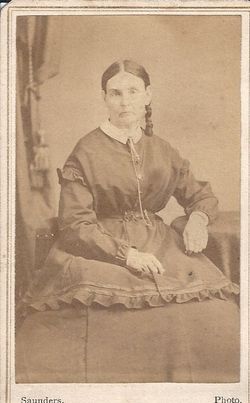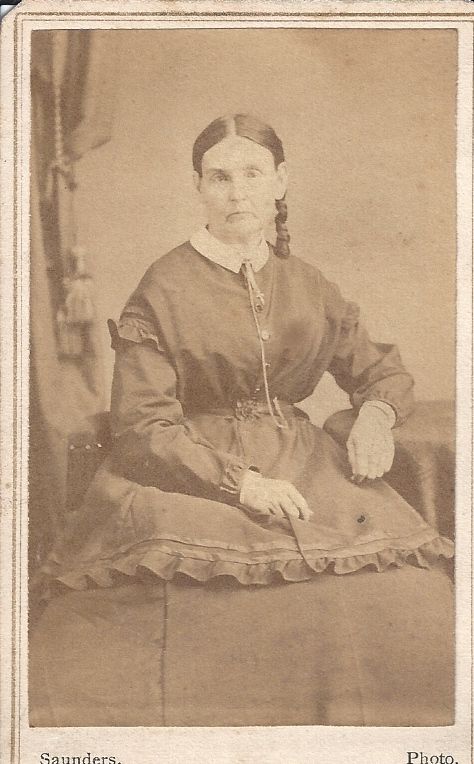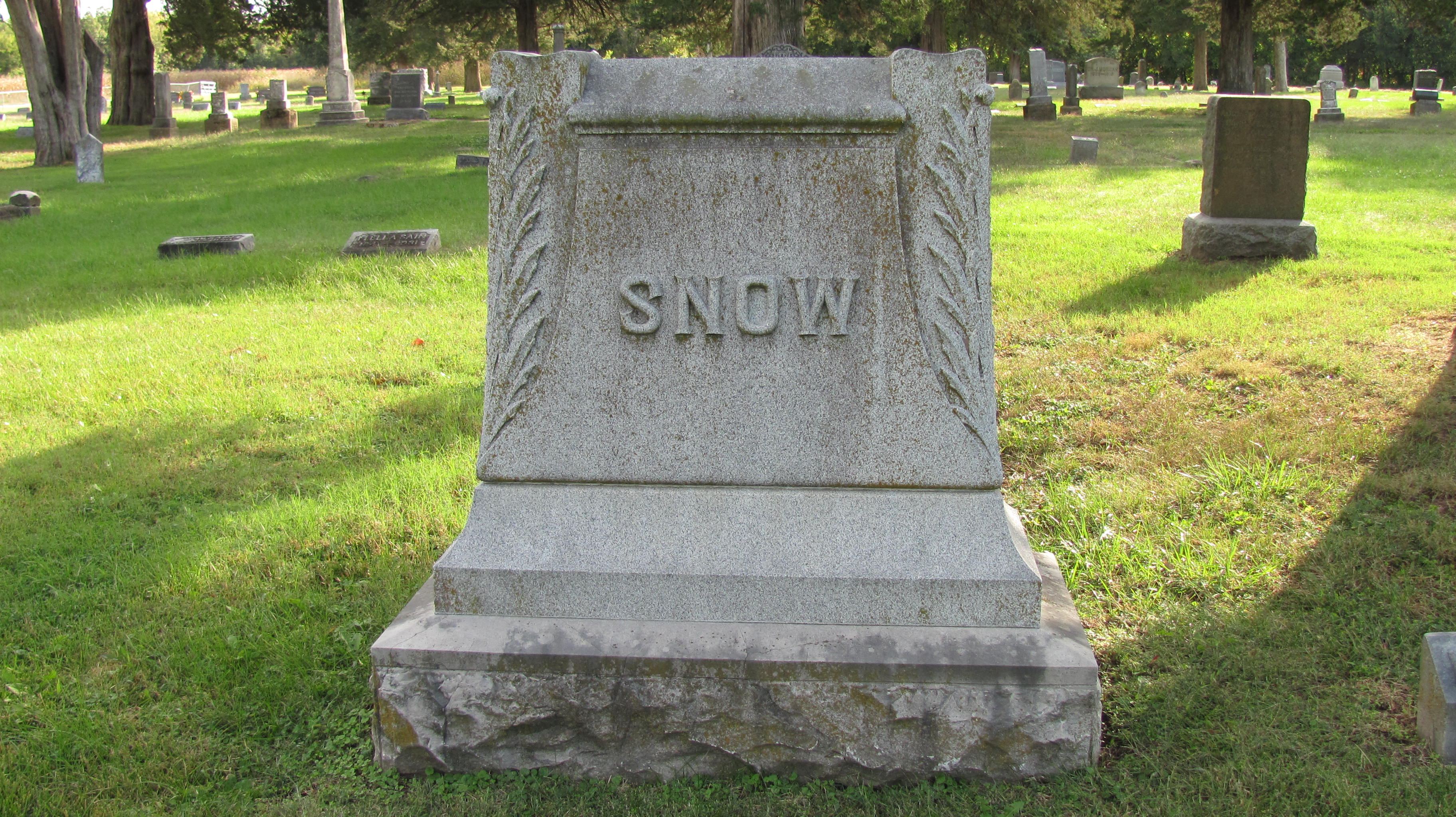There passed away at Neosho Falls a few days ago an old, old woman, nearly ninety-one years of age. She never was rich, she never was famous, she never did any one thing that was very wonderful, she had no special "accomplishmnents," she wasn't even "educated" as that term is now used, and for the last twenty years of her life she had been bound to an invalid's chair. And yet when she died it was to all who knew her as if a light had gone out, - a light they had been so long used to see gleaming with sure and steady radiance that they had almost forgotten it was mortal and could be quenched.
Lydia Harlan Snow was born on an Indiana timber farm - and a timber farm in Indiana nearly a hundred years ago could not have been a very pleasant place for a girl to be born into nor for a girl to be reared. Little chance for music and the other arts. Little chance for even the commonest schooling. But there was a father and mother of the staunchest pioneer stock, - the mother living until she had rounded out a full century and a little more, - and the privations were not realized. There were several girls in the family and but one boy, and the girls thought it was no more a hewer of wood and a drawer of fat - than natural and right that they should bear their full share of the farm work, out of doors as well as indoors that this boy might have a chance. And so it was through the sacrifice, joyously rendered, of his sisters as well as of his father and mother, that James Harlan got away from the timber farm, to Greencastle College, and did his work in the world, - work which carried him to the Senate of the United States and to Lincoln's Cabinet before it was all done, and wrote him down in the histories as Iowa's "Grand Old Man."
It was through the link with Lincoln supplied by the brother whom she had helped to give his chance in the world that Lydia Harlan Snow, in 1862, came to Kansas with her husband and their brood of little children to make her place in another frontier. It was a good place for an Indian agent to keep busy with some thousands of restless and often unruly Osages, but it was not a good place to school children. And so after a year or two of it the mother with her children removed to Baldwin, the father coming to them when he could, - putting his shoulder to the town and the then new and struggling college during the brief visits, and meanwhile keeping his restless Osages in proper subjection. But the time came when the Indians had to move on. By that time Neosho Falls had grown from an Indian agency into a smart village with dreams of growing into a still smarter city. Major Snow was the head of things there, with all sorts of enterprises and undertakings growing under his strong hands, and so the family came back from Baldwin and took the place which was theirs and which they have kept to this day.
For many years things went prosperously with them. the father farmed and raised fine stock and made the old Neosho Valley Fair which reached its superlative climax when, through the influence of the Senator brother, and his friend Robert Lincoln, President Hayes and General Sherman came to visit it, - giving the people of all this region a new date from which to reckon later events. In 1888, after long and harrowing illness the father died, - and with the passing of his bold and masterful spirit something went out of the wife that she never regained. It was a change that cannot be described, it can only be felt by those who have the heart to understand.
After that the days went by, one much like another, with patience and duty taking the place of eagerness and joy, until one wintry day twenty years ago there was a fall on treacherous ice and the broken bone which never knit again.
And then something came into the life, - something again that could not be described, that could only be felt by those that had the heart to understand. Nothing more happened. She simply stayed in the simple home, bound to her chair, while the monotonous days dawned and died and were born again, making up the monotonous years. But men and women came to her and talked with her and went away feeling that something new and sweet had come into their lives. Day after day her daughters ministered unto her, and day after day grew more grateful that the tender task was theirs, wondering daily at some new manifestation of the unerring intuition, the searching insight, the perfect taste that made her, as one of them has said, "the strongest and the serenest woman I ever knew."
The chair of the invalid became as if it were a shrine to which came all sorts and conditions of people to have their faith renewed, their faith in themselves, in human strength and goodness, in divine justice and mercy and loving kindness. Not that she preached, - she never did that. She simply lived. But it was such a luminous sort of living, such a light-house life, so heroic in its patient endurance, so complete in its sympathy, so broad in its outlook, so far above all pettiness, so fixed in its faith, so wholly purged of everything but pure spirit, that it entered into the hearts of all who came within the range of its sweet influence like a benediction.
But the end must needs come. A few days ago she died, - and those who looked out of the windows were darkened. For it was as if a light had gone out. Quietly, with no ostentation but with a deep sincerity the little village went into mourning. Men laid aside their business, women left their employments, and little children forgot their games to pay their tribute to this wonderful woman who for twenty years had been bound to her chair. The room that had been hers was heaped with flowers in token of gratitude and remembrance and love. And one who could not be there to place a wreath upon her grave, brings this brief tribute instead - because he loved her and was honored with her love.
C. F. S.
Published in the Iola Daily Register, Saturday Evening, November 16, 1912, Page 4
There passed away at Neosho Falls a few days ago an old, old woman, nearly ninety-one years of age. She never was rich, she never was famous, she never did any one thing that was very wonderful, she had no special "accomplishmnents," she wasn't even "educated" as that term is now used, and for the last twenty years of her life she had been bound to an invalid's chair. And yet when she died it was to all who knew her as if a light had gone out, - a light they had been so long used to see gleaming with sure and steady radiance that they had almost forgotten it was mortal and could be quenched.
Lydia Harlan Snow was born on an Indiana timber farm - and a timber farm in Indiana nearly a hundred years ago could not have been a very pleasant place for a girl to be born into nor for a girl to be reared. Little chance for music and the other arts. Little chance for even the commonest schooling. But there was a father and mother of the staunchest pioneer stock, - the mother living until she had rounded out a full century and a little more, - and the privations were not realized. There were several girls in the family and but one boy, and the girls thought it was no more a hewer of wood and a drawer of fat - than natural and right that they should bear their full share of the farm work, out of doors as well as indoors that this boy might have a chance. And so it was through the sacrifice, joyously rendered, of his sisters as well as of his father and mother, that James Harlan got away from the timber farm, to Greencastle College, and did his work in the world, - work which carried him to the Senate of the United States and to Lincoln's Cabinet before it was all done, and wrote him down in the histories as Iowa's "Grand Old Man."
It was through the link with Lincoln supplied by the brother whom she had helped to give his chance in the world that Lydia Harlan Snow, in 1862, came to Kansas with her husband and their brood of little children to make her place in another frontier. It was a good place for an Indian agent to keep busy with some thousands of restless and often unruly Osages, but it was not a good place to school children. And so after a year or two of it the mother with her children removed to Baldwin, the father coming to them when he could, - putting his shoulder to the town and the then new and struggling college during the brief visits, and meanwhile keeping his restless Osages in proper subjection. But the time came when the Indians had to move on. By that time Neosho Falls had grown from an Indian agency into a smart village with dreams of growing into a still smarter city. Major Snow was the head of things there, with all sorts of enterprises and undertakings growing under his strong hands, and so the family came back from Baldwin and took the place which was theirs and which they have kept to this day.
For many years things went prosperously with them. the father farmed and raised fine stock and made the old Neosho Valley Fair which reached its superlative climax when, through the influence of the Senator brother, and his friend Robert Lincoln, President Hayes and General Sherman came to visit it, - giving the people of all this region a new date from which to reckon later events. In 1888, after long and harrowing illness the father died, - and with the passing of his bold and masterful spirit something went out of the wife that she never regained. It was a change that cannot be described, it can only be felt by those who have the heart to understand.
After that the days went by, one much like another, with patience and duty taking the place of eagerness and joy, until one wintry day twenty years ago there was a fall on treacherous ice and the broken bone which never knit again.
And then something came into the life, - something again that could not be described, that could only be felt by those that had the heart to understand. Nothing more happened. She simply stayed in the simple home, bound to her chair, while the monotonous days dawned and died and were born again, making up the monotonous years. But men and women came to her and talked with her and went away feeling that something new and sweet had come into their lives. Day after day her daughters ministered unto her, and day after day grew more grateful that the tender task was theirs, wondering daily at some new manifestation of the unerring intuition, the searching insight, the perfect taste that made her, as one of them has said, "the strongest and the serenest woman I ever knew."
The chair of the invalid became as if it were a shrine to which came all sorts and conditions of people to have their faith renewed, their faith in themselves, in human strength and goodness, in divine justice and mercy and loving kindness. Not that she preached, - she never did that. She simply lived. But it was such a luminous sort of living, such a light-house life, so heroic in its patient endurance, so complete in its sympathy, so broad in its outlook, so far above all pettiness, so fixed in its faith, so wholly purged of everything but pure spirit, that it entered into the hearts of all who came within the range of its sweet influence like a benediction.
But the end must needs come. A few days ago she died, - and those who looked out of the windows were darkened. For it was as if a light had gone out. Quietly, with no ostentation but with a deep sincerity the little village went into mourning. Men laid aside their business, women left their employments, and little children forgot their games to pay their tribute to this wonderful woman who for twenty years had been bound to her chair. The room that had been hers was heaped with flowers in token of gratitude and remembrance and love. And one who could not be there to place a wreath upon her grave, brings this brief tribute instead - because he loved her and was honored with her love.
C. F. S.
Published in the Iola Daily Register, Saturday Evening, November 16, 1912, Page 4
Family Members
Sponsored by Ancestry
Advertisement
Explore more
Sponsored by Ancestry
Advertisement













